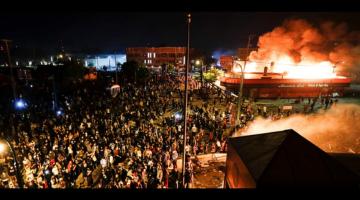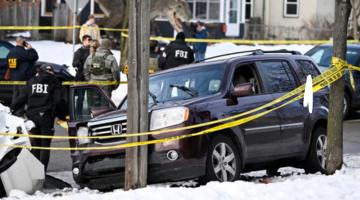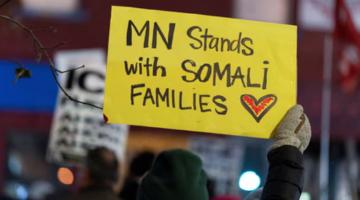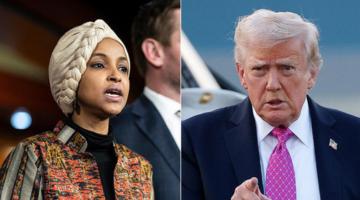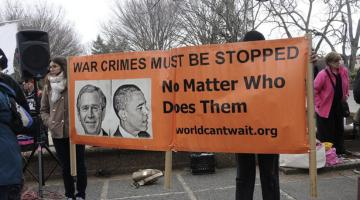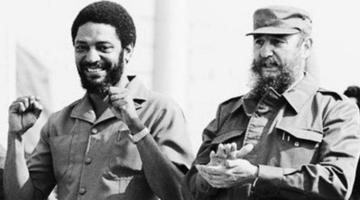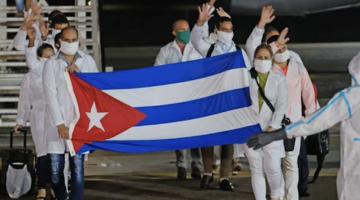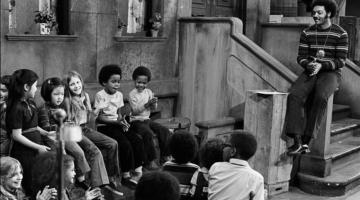Donald Trump’s new “Safe and Beautiful” task force is little more than a thinly veiled assault on Black working-class communities in Southeast D.C., accelerating policing, displacement, and white vigilante violence. This moment exposes a brutal collaboration between federal and city officials to criminalize poverty and consolidate racial control.
On March 27, 2025, Donald Trump signed an executive order establishing the “Safe and Beautiful” federal task force for Washington, DC. Framed as a public safety and beautification campaign, the initiative is led by his Homeland Security Advisor, Stephen Miller—a figure known for his hardline white nationalist policies. Under the guise of civic improvement, this task force seeks to further entrench surveillance, policing, and state control over DC’s most marginalized communities, particularly Black working-class residents in the Southeast neighborhood.
The order calls for a rapid expansion of federal law enforcement in the city, heightened pretrial detention, aggressive encampment clearances, increased immigration raids, and expedited licensing for concealed carry weapons—available, in Trump’s words, to “law-abiding citizens.” But beneath this language lies a clear agenda: consolidate white power, criminalize poverty, and militarize public space.
The expedited concealed carry provision is a particularly dangerous signal. It encourages white, affluent residents to arm themselves, invoking a vigilante ethos reminiscent of colonial settler militias. “Law-abiding” is not a neutral term; it encodes race, class, and political allegiance. The invitation to arm and police the city is not extended to all residents—it is targeted toward those who benefit from and uphold the existing racial and economic order. This strategy turns ordinary citizens into foot soldiers of state repression, authorizing them to defend property and privilege against imagined threats posed by the presence of poor Black people.
This moment is not new—it is a continuation of a long-standing colonial tradition in U.S. governance. Settler colonialism has always relied on deputizing white civilians to enforce racial boundaries and defend elite interests. From slave patrols to Jim Crow possees to “stand your ground” laws, white citizens have been authorized to use violence in defense of a racialized social order.
During the 2020 George Floyd uprisings, we saw armed civilians collaborating with police departments across the country, using protest as a pretext for violent reassertion of racial control. Trump’s current order revives that logic, cloaked in language about safety and civic pride. It asserts that DC’s white and wealthy wards must be secured, and the presence of Black working-class people is rendered not only undesirable, but criminal.
To be clear, Trump’s order did not introduce these policies from scratch—they merely formalized and expanded practices already embraced by the DC government. Under Mayor Muriel Bowser and the DC Council, the city has long adopted a punitive, repressive approach to poverty and displacement. The 2024 Secure DC Omnibus Crime Bill expanded pretrial detention, granting judges more discretion to incarcerate individuals before trial based on vague predictions of risk. This has led to a surge in jail populations, disproportionately affecting Black residents in Southeast DC. The more recently proposed DC Peace Plan, would further increase police funding and usher in a permanent expansion of pretrial detention. Excessive and arbitrary pretrial detention has long been considered a violation of international human rights.
Even before the federal task force was launched, the city conducted aggressive encampment sweeps under the pretense of public health, displacing unhoused residents without providing stable alternatives. Transit police began cracking down on fare evasion in December 2024, further criminalizing the daily survival of low-income riders. Last week, D.C. launched a new juvenile crime unit, a measure likely to increase the criminalization and harassment of D.C. youth. These moves were not incidental—they reflected a strategic consensus between local and federal actors on policing the poor.
In effect, DC’s local leadership did Trump’s bidding before this executive order.. The same Democratic officials who posture as defenders of the city against federal overreach have in practice laid the groundwork for a full-scale assault on Southeast DC. The repression we are seeing now is not a clash between federal authoritarianism and local progressivism—it is a collaboration.
At the heart of this repression lies a profound contradiction: the state punishes people not for what they have done, but for what they lack. The homeless are not criminalized for actions, but for existing without shelter. Fare evaders are not punished for theft, but for poverty. Those detained pretrial are not convicted criminals, but people who cannot afford bail or who the court deems “risky” based on opaque metrics.
The city’s approach treats deprivation as deviance. It does not address the root causes of poverty—joblessness, gentrification, structural racism—but instead targets the visible signs of social failure. The presence of unhoused people in parks, the visibility of mental health crises on public transportation, the survival economies people turn to when excluded from formal labor—these are not treated as social emergencies, but as threats to be removed.
In this system, the absence of resources becomes grounds for incarceration. Hunger is met with handcuffs. Displacement is met with surveillance. The logic of colonial control defines who is allowed to exist in the city and under what terms. Poor and working-class Black people are not only excluded from the city’s prosperity—they are blamed for disrupting its image.
For decades, political leaders have framed DC statehood as a solution to federal intrusion and Home Rule as democratic protection for DC residents. But these crises reveal the hollowness of those positions. The problem is not merely that DC lacks representation—it’s that its elected representatives are themselves deeply implicated in maintaining the status quo.
Statehood will not resolve the crisis when local officials already embrace draconian policies. Home Rule means little when the city uses its autonomy to displace the poor and protect real estate interests. Democratic leadership in DC has repeatedly shown that it is more invested in attracting capital than in defending communities. The problem is not just who governs—it’s how they govern, and on whose behalf.
Trump’s agenda did not descend on DC as a foreign imposition. It emerged from a bipartisan consensus that treats working-class Black life as disposable. Statehood might change the city’s formal status, but it won’t transform the deeper power structures that define who is safe, who is served, and who is sacrificed.
True safety will not come from more police, more surveillance, or more statehood. It will come from collective self-determination and community resilience. We must build power from below—through organizing, mutual aid, and political education—to challenge the systems that have abandoned and targeted us.
Survival programs are a cornerstone of this effort. Rooted in the legacy of the Black Panther Party, survival programs meet people’s immediate needs while raising consciousness about the systems that produce those needs in the first place. This means setting up community-run food distribution, free clinics, tenants’ unions, legal defense funds, and harm reduction centers. It means creating networks of care that don’t rely on the nonprofit industrial complex or city contracts, but are autonomous and accountable to the people they serve.
Popular education campaigns are equally essential. Communities must understand not just the what of these policies, but the why—why homelessness is punished instead of solved, why police budgets grow while schools crumble, why poor Black neighborhoods are always the ones targeted. Education must be participatory, rooted in raising political consciousness, and focused on action. It is not enough to critique the system—we must equip people to change it.
Political independence is also key. Communities must stop relying on corporate-backed candidates who claim progressive values but govern through repression. Instead, we must build independent coalitions and decision making structures that challenge the political establishment, not negotiate with it.
The struggle for Southeast DC is a struggle against colonial control. It is not just about resisting Trump or criticizing Bowser—it is about overturning the entire arrangement that treats Black working-class communities as disposable. We are not fighting for inclusion in a system built on our exclusion. We are fighting to dismantle that system and build something new.
DC will not be saved by statehood. It will not be redeemed by Democratic majorities. Its liberation will come from the people who have always borne the brunt of state violence—and who continue to organize, resist, and imagine another world. The task ahead is not only to survive, but to fight—and to win.
Oliver Robinson is an organizer in Pan-African Community Action (PACA), a DC based group of African people organizing for locally based power.



